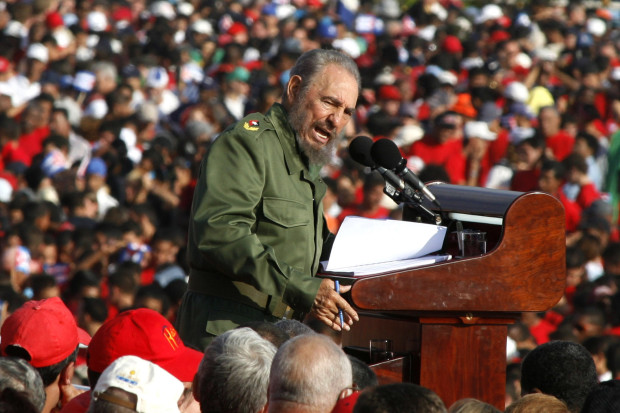
In this May 1, 2006 file photo, Cuba’s leader Fidel Castro speaks on International Workers Day in Revolution Plaza in Havana, Cuba. Former President Fidel Castro, who led a rebel army to improbable victory in Cuba, embraced Soviet-style communism and defied the power of 10 U.S. presidents during his half century rule, has died at age 90. The bearded revolutionary, who survived a crippling U.S. trade embargo as well as dozens, possibly hundreds, of assassination plots, died eight years after ill health forced him to formally hand power over to his younger brother Raul, who announced his death late Friday, Nov. 25, 2016, on state television. AP FILE PHOTO
HAVANA, Cuba – Beyond his native Caribbean island, Fidel Castro’s revolutionary fire set alight much of Latin America, helping drive numerous leftist allies to power in a tide that is now turning.
“Cuba was a model, a beacon for the left in Latin America,” said Gaspard Estrada, head of the Latin America Observatory at the Sciences Po politics institute in Paris.
Over the decades, Cuba became a mecca for Latin American leftist dissidents. Thousands of men trained at the Punta Cero military camp near Havana and took up arms against the US-backed right-wing regimes that prevailed in the region.
READ: Fidel Castro, Cuban leader who defied US for 50 years, dies at 90
Here are some of Castro’s most prominent friends and admirers across the continent over the years.
Chavez
Venezuela’s late socialist leader Hugo Chavez possibly came closest to matching Castro’s revolutionary fervor and charisma in recent times.
Castro had backed guerrillas in Venezuela in the early 1960s, as in various other countries.
But it was not until 1998 that Chavez was elected, ushering in what he called “21st-century socialism” strongly influenced by the Cuban revolution.
Often appearing in public with his friend Fidel, Chavez became the Latin American left’s provocateur-in-chief with respect to the United States.
Chavez died in 2014 and his protege Nicolas Maduro was elected to replace him. Maduro is now facing pressure to quit over a grave economic crisis.
READ: Grief and joy erupt at Fidel Castro’s death
Lula
Brazil’s former president Luiz Inacio Lula da Silva became Cuba’s second most prominent ally after Chavez.
A working class union leader, Lula came to power in 2003 and presided over a boom in Latin America’s biggest country, winning international plaudits.
But Brazil plunged into recession in 2015 under Lula’s successor Dilma Rousseff. She was impeached this year, when conservatives came to power.
Kirchner
Castro allies dominated politics in Argentina from 2003 under Nestor Kirchner and his wife Cristina, who succeeded him in 2007.
Reacting after Castro’s death, Cristina Kirchner called her friend Castro and Cuba “an example of dignity and sovereignty.”
She became one of the most outspoken anti-US figures in the so-called “pink tide” of leftist governments that swept Latin America from the late 1990s.
She left office a year ago, replaced by conservative Mauricio Macri in another shift to the right.
READ: Imagining Cuba’s human rights situation after Fidel Castro
Morales
Bolivia’s president Evo Morales is a confessed admirer of Castro, whom he has called “wise grandfather.”
A former farmer and unionist, Morales became the first indigenous person to become Bolivia’s president in 2006.
He hailed Castro after his death as “the master of revolutionaries.”
“He guided us to raise our voices against those who tried to impose policies of domination to rob us of our natural resources,” Morales said in a speech.
Morales lost a referendum in February on whether he should be allowed to stand for a fourth term in office.
Ortega
Castro backed the 1979 Sandinista revolution in Nicaragua, a staunch ally of its guerrilla leader, Daniel Ortega.
Unlike some leaders in the “pink tide,” Ortega is hanging on. He won re-election this month to a third consecutive term. His opponents say the poll was rigged.
Castro also helped the rebel groups that formed the Farabundo Marti front in nearby El Salvador in the 1980s. One of its former commanders, Salvador Sanchez Ceren, is currently president.
Castro “is mourned in Cuba, across Latin America and in other places because of what he symbolized for the independence of his country and national pride, as a fighter for self-determination,” said Geoff Thale of the Office on Latin America, a Washington-based NGO./rga